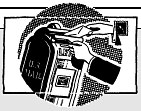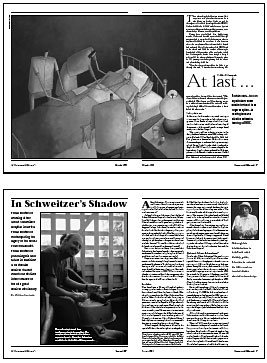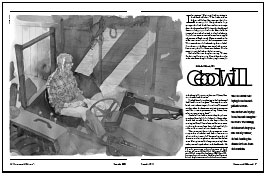Letters
Articles from two and three issues ago are still resonating with readers. Among the pieces coming in for comment were "At last . . ." and a companion feature on care of the dying in Winter 1999, as well as that issue's cover story on Denali; "In Schweitzer's Shadow" in the Spring issue; and "What Makes My Baby Blue?" and "Good Will" in the Summer issue. Readers also sought further information on clinical research described in two recent stories.
Resonant frequency
Although several months have passed since I received your Winter 1999 issue, I find that the thought-provoking articles on end-of-life care continue to resonate in my mind and heart.
The reflective editor's note, Mary Daubenspeck's feature on palliative care at DHMC, and all three personal meditations on death go to the heart of the matter. Each one helps your readers to take in on a deeper level the inescapable truth inscribed on a headstone in a Sicilian graveyard: "Where you are, I was. Where I am, you will be."
In addition, my husband and I thoroughly enjoyed the dramatic account in the same issue of Dudley Weider's adventures on Denali.
Sheila Harvey Tanzer
Hanover, N.H.
Remembering Schweitzer
I enjoyed very much Will Anninger's account of his experience in Lambarene, Gabon ("In Schweitzer's Shadow," Spring 2000). I was Dr. Schweitzer's surgeon for a few months at the end of 1960, after I had finished my general surgery residency.
It was an amazing experience to work with Schweitzer, and I totally concur with Anninger's next-to-last paragraph about Schweitzer's being "an enlightened thinker." I always said that those who criticized him should at least try to do something for other human beings.
I have not returned to Lambarene since then, and I found the photograph of the old hospital buildings extremely poignant. I remember so many instances of working with Dr. Schweitzer in the dispensary and operating in the little theater nearby.
I am a graduate of Harvard Medical School, but because of a contribution to Dartmouth Medical School to honor Dr. Radford Tanzer, I receive Dartmouth Medicine. I am glad that I do, because it was a wonderful opportunity to relive those days. Incidentally, after I returned from Gabon, I put together an article with Dr. Richard Friedman for the New England Journal of Medicine, about Dr. Schweitzer and his hospital.
I wish Will Anninger the best of luck in the future.
Robert M. Goldwyn, M.D.
Brookline, Mass.
Burning questions
I enjoyed Will Anninger's article about Schweitzer immensely. He is a very good writer.
I was surgeon-in-chief and medical director of l'Hopital Albert Schweitzer in Haiti for not quite 10 years, and I worked in other more primitive clinics in Haiti for several months more. I have the same question Anninger raises in his article: How does one keep the flame alive?
Dr. Mellon, the founder of the facility in Haiti where I worked, died a few years ago. Dr. Mellon was a devoted disciple of Schweitzer and felt a commitment to continue all things Schweitzer. Dr. Mellon spent most of his day in the countryside but always attended the Saturday morning conference. Mrs. Mellon was in the hospital clinics all day on Monday, Wednesday, and Friday and part of every other day. The hospital is definitely not an evangelizing institution, but there is a spiritual presence. The Schweitzer-Mellon connection had an effect on how the place functioned. Mrs. Mellon is still there and active at age 88. But will it be the same when she dies?
Then there is the old question of who benefited more from this work, we or the Haitians— the donor or the recipient? I had the time of my life there, worked very hard, and of course contributed much to the health of Haitians. It was good for my family, too. We did home schooling, had no TV or movies, etc.
However, my return to the States was traumatic. I was out of synch with the mores of modern U.S. medicine, particularly the monetary aspects of it. Two years working at the Frontier Nursing Service in eastern Kentucky helped me to adjust, however.
I am not the philosophical type and generally think it unproductive to spend time on such amorphous concerns. That is why I became a surgeon. But I do thank Will Anninger for his excellent article.
Frank J. Lepreau, M.D.
DC '34 and HS '38-40
Westport, Mass.
 We're always glad to
hear from readers
—whether it's a letter
from a longtime subscriber
who's weighing in
with an opinion, or a
note from someone who would like to
become a longtime subscriber. In fact, we are happy to send Dartmouth
Medicine—on a complimentary basis—to anyone who
is interested in the subjects that are covered in the magazine. We
regret, however, that the complimentary subscription offer can be
extended only to addresses in North America. Both subscription
requests and letters to the editor may be sent to: Editor, Dartmouth
Medicine, One Medical Center Drive (HB 7070),
Lebanon, NH 03756, or via e-mail to:
dartmed@dartmouth.edu.
Letters for publication may be edited for clarity or length.
We're always glad to
hear from readers
—whether it's a letter
from a longtime subscriber
who's weighing in
with an opinion, or a
note from someone who would like to
become a longtime subscriber. In fact, we are happy to send Dartmouth
Medicine—on a complimentary basis—to anyone who
is interested in the subjects that are covered in the magazine. We
regret, however, that the complimentary subscription offer can be
extended only to addresses in North America. Both subscription
requests and letters to the editor may be sent to: Editor, Dartmouth
Medicine, One Medical Center Drive (HB 7070),
Lebanon, NH 03756, or via e-mail to:
dartmed@dartmouth.edu.
Letters for publication may be edited for clarity or length.
Blueprint
I enjoyed Roger Smith's article in the Summer issue about "blue babies" and the associated piece describing what inspired him to do the work he does. I remember reading "Eleven Blue Men" when I was in high school and really enjoying it. Lately, it has been going through my mind that I would like to find the book again; I consider it very serendipitous that the information came to me the way it did. I plan to find as many of Berton Roueche's books as I can and reacquaint myself with his stories.
Beth Hindmarsh
Wilder, Vt.
The only anthology of Roueche's stories currently in print is a paperback titled The Medical Detectives. His other collections of medical detective stories (all of them originally written for the New Yorker's "Annals of Medicine" section) include Eleven Blue Men, The Orange Man, The Man Who Grew Two Breasts, and Annals of Epidemiology, plus an expanded, two-volume edition of The Medical Detectives; they may be available in libraries. Roueche fans may be interested to know that Roger Smith, with the help of DMS students, has written addendums to some of Roueche's stories (which are from the '40s to the '70s)—updating their scientific and medical aspects; the addendums are at http://www.dartmouth.edu/~rpsmith/index.html.
A matter of perception
I enjoyed "What makes my baby blue?" by Roger Smith in the Summer issue.
However, the article's explanation of the perception of blue color from a superficial vein is incorrect. Although it is commonly believed that reduced hemoglobin is blue, measurement of the spectral transmittance of blood reveals that reduction does not appreciably alter the dominant wavelength from red. Dr. Peter L. Reisfeld, in an article titled "Blue in the skin" in the Journal of the American Academy of Dermatology (42:597-605, 2000), persuasively argues that the bluish color of superficial veins is better explained by color contrast than by other theories, including light-scattering.
It is thus likely that the blue color associated with cyanosis is also not explained by the color of deoxyhemoglobin, since a similar appearance can be seen when the body temperature is reduced. Cyanosis is more likely related to changes in superficial blood flow, although how this results in the perception of blue is unclear to me.
John W. Melski, M.D.
DMS '68
Marshfield, Wisc.
Roger Smith replies as follows to the questions raised in this letter: "I would like to thank Dr. Melski for his kind words about my article and for drawing my attention to the very recent and interesting paper by Dr. Reisfeld. It is certainly true that when oxyhemoglobin is degassed with nitrogen, the spectrophotometric shift from the dominant wavelengths is not particularly dramatic. But I think what I was talking about in my article is not what the spectrophotometer sees, but what is seen by the naked eye. The evident change in color from a robust red to a bluish-purple cannot be denied.
"I absolutely agree that that change becomes much more ambiguous when it takes place only incompletely in blood vessels under skin layers that have different degrees of pigmentation. However, as I read Dr. Reisfeld's article, it seems to me that he is attempting to explain why veins appear blue in spite of some reasons why perhaps they should not. By going to extreme lengths with varying backgrounds, different areas of surrounding skin, and color-matching with standardized chips, he found that most subjects perceived the color of veins to be yellowish-gray and not blue. He then explains the original perception of the blue color as due to color-contrast instead of the former theory of light-scattering. Our eyes may be deceiving us, but, at the bedside and in the laboratory, we see what we see. When the concentration of deoxyhemoglobin in blood increases, the subject's skin becomes more blue, not more yellowish-gray.
"Thanks to Dr. Melski and Dr. Reisfeld for reminding us that blood flow is an extremely important determinant of skin color."

|
|
These articles—the top one from the Winter issue and the bottom one from Spring—piqued the interest of readers. |
Hopeful note
I was very impressed with two articles in the Summer 2000 issue of Dartmouth Medicine—the story titled "Good Will" by Dr. Donald Kollisch and the "Viewpoint" essay on medical errors by Dr. Joseph Wilder.
During the final illness several years ago of my longtime friend Ilse Winter, and after her death, I suffered much pain and disappointment over the medical attention she received. Dr. Wilder's essay mentions all of my experiences.
But on the other hand, how comforting it is to know that there are people like Don Kollisch on the staff—he is just the kind of physician one likes to have. There are many of them at DHMC, but also some of the other kind as well.
And further cause for optimism is offered by one other piece in the same issue: the brief item in the "Media Mentions" section about Dr. Joseph O'Donnell's work in trying to "nurture a new generation of kinder, gentler doctors."
There is hope in sight!
Martina Quellmann, R.N.
Hanover, N.H.
Choices
I have just finished reading the article in the Summer issue about Dr. Lisabeth Maloney's choice to limit her career hours so she can spend more time with her children. I agree that this is a laudable goal, and I, as well as many woman physicians, struggle with how best to balance family and professional demands.
However, reporting her decision to limit her workweek to 45 hours as tremendously gutsy and a possible hindrance to her career shows how little progress has occurred in the medical establishment's understanding that highly competent women should be able to limit their hours when their children are young without feeling their career is at risk.
The other presumption that needs to be challenged is that the most dedicated physicians are the ones who spend the most hours at work.
Dale Pollack, M.D.
Keene, N.H.
Be a SPORT!
When I received the Summer issue of Dartmouth Medicine, my attention was riveted by the article about Dr. James Weinstein's Spine Patient Outcomes Research Trial (SPORT), because I am uncertain what to do next about a sometimes very painful back condition.
After x-rays and an MRI last year, my condition was diagnosed as DISH (diffuse idiopathic skeletal hyperostosis) syndrome. My doctor's opinion: "If you can't walk a mile, we'll talk about surgery."
At 77, I'm athletic and in very good health otherwise. I ride a bike four or five miles about five times a week, which causes no pain at all. I had no pain skiing last winter either, though I do feel modest pain by the end of a round of golf. And I don't walk well, but can go two or three miles with only modest pain. The sharpest pain comes during the night, upon turning over in bed or getting up.
Could I be one of the 1,450 SPORT enrollees? Are any New Jersey hospitals participating? Or could I be enrolled at DHMC?
David T. Nutt
Dartmouth College '44
Monroe Township, N.J.
According to the DHMC Spine Center, which is coordinating the study, patients who can answer "yes" to any of questions 1 to 3 below may be eligible for SPORT:
1) Have you ever been diagnosed with either a herniated disc, spinal stenosis, or degenerative spondylolisthesis?
2) Do you have low-back pain that radiates into your buttock, thigh, or leg?
3) Do you have any loss of sensation or weakness in your leg(s)?
However, patients who can answer "yes" to any of questions 4 to 6 are not eligible for SPORT:
4) Have you ever had surgery on your back?
5) Are you pregnant?
6) Are you under 18 years of age?
The institutions participating in SPORT, and a phone number at each for more information, are:
- DHMC, 888/794-2225
- Hospital for Special Surgery in New York, 212/774-2984
- NYU/Hospital for Joint Diseases in New York, 212/598-6114
- Thomas Jefferson Hospital in Philadelphia, 215/955-4987
- University Hospitals of Cleveland, 216/844-8053
- Rush Presbyterian-St. Luke's Medical Center in Chicago, 312/ 243-4244, ext. 4101
- Washington University in St. Louis, 314/747-2817
- Nebraska Foundation for Spine Research in Omaha, 402/ 496-5513
- William Beaumont Hospital in Royal Oak, Mich., 248/217- 0528
- Emory University in Decatur, Ga., 404/778-7172
- UCSF Medical Center in San Francisco, 415/514-1509.

|
|
This story in the Summer issue showed medicine at its best, writes a reader. |
CAPD query
I graduated from DMS in June and am now in residency in Pittsburgh. I was very interested in the article in the Summer issue about central auditory processing disorder (CAPD), because my brother has CAPD and has had a difficult time.
I'm wondering whether Dr. Musiek knows of anyone in Pennsylvania who works with this disorder. Or could he tell us where we could find more resources and information about CAPD?
I wish I'd known about Dr. Musiek when I was still at DMS!
Lisa Thomas, M.D.
DMS '00
Pittsburgh, Pa.
Anyone interested in information on testing and treatment for CAPD can contact the DHMC Section of Audiology at 603/650-8125 or the American Academy of Audiology at 800/222-2336.
Musings about medicine
I wanted to share with your readers some "thoughts at age 90." Once upon a time, I was listened to respectfully. But today, I am automatically branded a Medicare patient—incompetent or incontinent.
A white thatch is not a sign of senility. When the diagnosis is that the patient is allergic to old age, a little understanding and patience are the best therapy. Many of us simply want to slow down the inevitable, to buy a little more time with fewer aches and discomforts.
At birth, all of us receive a tank full of "gas" (time) for our journey—some more, some less. Some waste it on detours and dead-ends; others race and destroy their motors going nowhere fast. To continue the analogy, some of us experience minor malfunctions; others may need a major overhaul, like a valve job or even a new motor (a transplant); still others wear out or rust. But sooner or later, everyone runs out of gas (time) and the car(cass) stops.
Have you ever experienced the panicky feeling when you suddenly realize that your car's gas gauge reads "empty," and you don't know if you have enough to make it to the next gas station? My problem now is knowing that there's no chance for another fill-up, that my journey is about to end abruptly—when and where, nobody knows.
So here is my suggestion: Until medical science achieves the miracle of extended life, perhaps the American Medical Association could establish a senior corps of physicians—septuagenarians and octogenarians—who would have empathy for the ills and fears of their contemporaries. And let me remind younger doctors that I am not a statistic—if I were, I would have died several years ago.
Neal Landy
Grafton, Vt.
Encouraging words
I received a copy of your magazine after a recent visit to the Medical School and found it interesting and informative. I particularly enjoyed the articles in the "Viewpoint" and "Student Perspective" sections.
In this age of so much negative publicity about health care, it was encouraging to hear about all the wonderful contributions the Dartmouth community is making to medicine.
Keep up the good work!
Donald Sullivan
Candia, N.H.
Musiek to a teacher's ears
Dartmouth Medicine is a wonderful magazine. I am a teacher in Littleton, N.H., and I enjoy reading it whenever I'm at DHMC. I happened to pick up a copy of your Summer issue on a recent visit, and I really enjoyed the article about Dr. Frank Musiek and CAPD.
Since I am only down there a couple of times a year, however, I usually miss one or two issues. I'd like to be guaranteed to get them all! Thank you for offering such a wonderful publication.
Sharon M. Dodge
Littleton, N.H.
Devotee of Dartmouth doings
I've been reading your fine publication for several months, thanks to an existing avid subscriber, Joseph W. Davis, DC '36. Recently Mr. Davis suggested that I get my own subscription! Would you please add my name to your mailing list?
I've only been in the Upper Valley for 11 months but am delighted with this area, ILEAD, Dartmouth doings, etc.
Karin W. Akin
Hanover, N.H.
Delayed reaction
I am not sure how we could have missed being on the subscription list of your excellent magazine. We have been at the College since '66! Please add us to your list. Thank you in advance.
Walter and Miriam Arndt
Hanover, N.H.
It's not necessary to have lived near Dartmouth for 11 months—much less 411 months—to be on Dartmouth Medicine's mailing list. We're happy to add anyone interested in the magazine to our subscription rolls. See the box on page 24 for how to contact us.
 Be sure to tell us when you
move! If your address
changes and you want to
continue to receive the magazine,
just tear off the back
cover of the most recent issue,
write your new address
next to your old one, and mail it to: Dartmouth Medicine, One
Medical Center Drive (HB 7070), Lebanon, NH 03756. It helps
us greatly—since our mailing list is drawn from eight separate
databases—if you send the actual cover (or a photocopy), rather
than just your new address. Note, too, that if you receive more
than one copy of the magazine, it's because of those eight databases.
We're happy to eliminate duplications, but once again it's
a great help if we have the address panel from the cover of all the
copies you receive, not just the one(s) you'd like deleted.
Be sure to tell us when you
move! If your address
changes and you want to
continue to receive the magazine,
just tear off the back
cover of the most recent issue,
write your new address
next to your old one, and mail it to: Dartmouth Medicine, One
Medical Center Drive (HB 7070), Lebanon, NH 03756. It helps
us greatly—since our mailing list is drawn from eight separate
databases—if you send the actual cover (or a photocopy), rather
than just your new address. Note, too, that if you receive more
than one copy of the magazine, it's because of those eight databases.
We're happy to eliminate duplications, but once again it's
a great help if we have the address panel from the cover of all the
copies you receive, not just the one(s) you'd like deleted.
Back to Fall 2000 Dartmouth Medicine
